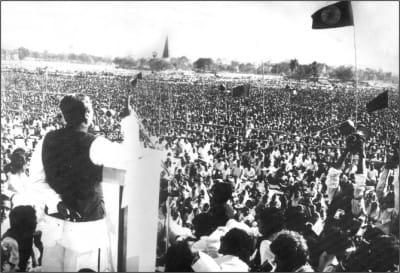The speech that steeled the nation

On 15 August 1975 Bangabandhu told the traitors, "The people put me here and the only way I will leave this country will be as a dead person."
This makes us recall the breezes of Bashanta on that day of seventh March, thirty-nine years ago, which spread all over the country, Bangabandhu's words: "Ebareyr shangram amader muktir shangram, ebareyr shangram shadhinatar shangram"
These words of fire inflamed the hearts and minds of every Bengali at Suhrawardy Uddyan (Race Course at the time) on that day, and all other Bengalis who heard it over the airwaves. This speech was the turning point in our history. In the words of another great man of this subcontinent, the Bengali nation was going forward to its 'tryst with destiny'. In a speech of about a quarter of an hour, the hour of the Bengali nation had arrived.
Since that day and that speech, many more have been made in the political and historical context of our country, some of them by Bangabandhu Sheikh Mujibur Rahman, but if one speech can be likened to the Gettysburg address of Abraham Lincoln, it was this speech and this speech alone. Abraham Lincoln and Bangabandhu Sheikh Mujibur Rahmna were the true upholders of democracy and the liberators of their peoples --- of all races and religions, colour and creed.
At the commemoration of a cemetery for Civil War soldiers in the little Pennsylvanian town of Gettysburg on November 19, 1863, the main speaker of the day was not Abraham Lincoln, but the orator Everett. At 2 pm, two long, cold hours after starting, Everett concluded his speech and turned the dais over to President Lincoln. Lincoln rose awkwardly before an audience of perhaps fifteen thousand people, adjusted his glasses (as contemporary records show), held the paper on which his speech was written in front of his face, and in a high, reedy voice, delivered his address. He barely took his eyes off the manuscript, according to one witness, as he intoned those famous words, "Four score and seven years ago, our fathers brought forth on this continent a new nation, conceived in liberty and dedicated to the proposition that all men are created equal . . ." Towards the end, he noted that "government of the people, by the people, for the people, shall not perish from the earth."
The Gettysburg address contained just 268 words, two-thirds of them with only one syllable, mostly short, direct and memorably crystalline sentences. It took less than three minutesso little, according to several contemporary accounts, that the official photographer was still making preliminary adjustments to his camera, when the President of the United States sat down. Lincoln thought the speech a failure. Even newspapers sympathetic to Lincoln scarcely noted his address. Not until considerably later was it perceived as perhaps the greatest of American speeches, and one of the greatest in the world.
The Seventh March speech of Bangabandhu, on the other hand, was immediately recognised as a great speech, a speech that liberated Bangladesh almost at that hour. But he also spoke directly to the people in simple, clear sentences, which were embedded in our hearts and minds. When he finished, not a single soul disagreed with him. Two hundred years on, in our history, this speech will rekindle the fire of revolt, the aspirations of freedom, the establishment of human rights in our successor generations.

 For all latest news, follow The Daily Star's Google News channel.
For all latest news, follow The Daily Star's Google News channel. 



Comments